中外禁忌的一些区别(英语课题) TABOO
中英人之间的语言禁忌差异
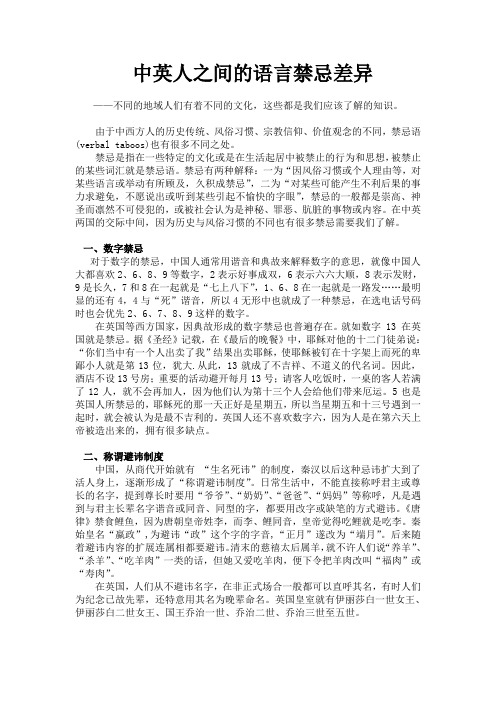
中英人之间的语言禁忌差异——不同的地域人们有着不同的文化,这些都是我们应该了解的知识。
由于中西方人的历史传统、风俗习惯、宗教信仰、价值观念的不同,禁忌语(verbal taboos)也有很多不同之处。
禁忌是指在一些特定的文化或是在生活起居中被禁止的行为和思想,被禁止的某些词汇就是禁忌语。
禁忌有两种解释:一为“因风俗习惯或个人理由等,对某些语言或举动有所顾及,久积成禁忌”,二为“对某些可能产生不利后果的事力求避免,不愿说出或听到某些引起不愉快的字眼”,禁忌的一般都是崇高、神圣而凛然不可侵犯的,或被社会认为是神秘、罪恶、肮脏的事物或内容。
在中英两国的交际中间,因为历史与风俗习惯的不同也有很多禁忌需要我们了解。
一、数字禁忌对于数字的禁忌,中国人通常用谐音和典故来解释数字的意思,就像中国人大都喜欢2、6、8、9等数字,2表示好事成双,6表示六六大顺,8表示发财,9是长久,7和8在一起就是“七上八下”,1、6、8在一起就是一路发……最明显的还有4,4与“死”谐音,所以4无形中也就成了一种禁忌,在选电话号码时也会优先2、6、7、8、9这样的数字。
在英国等西方国家,因典故形成的数字禁忌也普遍存在。
就如数字 13 在英国就是禁忌。
据《圣经》记载,在《最后的晚餐》中,耶稣对他的十二门徒弟说:“你们当中有一个人出卖了我”结果出卖耶稣,使耶稣被钉在十字架上而死的卑鄙小人就是第13位,犹大.从此,13就成了不吉祥、不道义的代名词。
因此,酒店不设13号房;重要的活动避开每月13号;请客人吃饭时,一桌的客人若满了12人,就不会再加人,因为他们认为第十三个人会给他们带来厄运。
5也是英国人所禁忌的,耶稣死的那一天正好是星期五,所以当星期五和十三号遇到一起时,就会被认为是最不吉利的。
英国人还不喜欢数字六,因为人是在第六天上帝被造出来的,拥有很多缺点。
二、称谓避讳制度中国,从商代开始就有“生名死讳”的制度,秦汉以后这种忌讳扩大到了活人身上,逐渐形成了“称谓避讳制度”。
中西方交流下禁忌文化的异同

【作者简介】韩佳楠(1994-),女,黑龙江哈尔滨人,黑龙江大学研究生学院在读硕士研究生,主要从事跨文化交际、对外汉语语法研究。
【摘要】比较中西方文化,我们不难发现,不同的国家、地区,有着不同的文化,禁忌文化作为文化中的一种更是如此,如果我们不了解禁忌文化,就很可能造成跨文化交际的失败。
下面简要介绍了在中西方文化交流下与人们息息相关的禁忌文化中的几方面,以及禁忌文化对中西方交流的意义和影响,探索禁忌文化的内涵,以便人们更好的交流,避免交际失误。
【关键词】中西方;交流;禁忌文化;比较【中图分类号】G04【文献标识码】A【文章编号】1009-3036(2018)04-0047-03引言由于中国与其他国家地理位置、历史背景、价值观念、生活方式等的不同,所以中西方文化存在着很大的差异。
禁忌文化更是其中最为敏感之处,禁忌文化作为社会生活中不可缺少的一部分,它时刻约束着人们的行为,要想更好的交际,必须了解中西方的禁忌文化,以避免其成为中西方交流的障碍。
一、禁忌禁忌,在英语中的对应词是“taboo ”有的写作tabu 或者tapu ,有人将它音译为“塔布”。
它源自于太平洋波利尼西亚汤加岛的土语,其含义是神圣的、非凡的,后来又引申为危险的、禁止的、不可触摸的。
所谓禁忌,就是指在日常生活中忌讳或者禁止人们说某些话或者做某些事情,它在一定程度上约束着人们的行为举止,它来源于不同国家的政治、经济、文化背景,来源于人们对大自然的敬畏,来源于一定的约定俗成。
二、中西方的几种典型禁忌类别比较(一)饮食禁忌“民以食为天”,饮食文化博大精深,自然中西方的饮食文化必然会有许多不同和禁忌。
在中国,梨是不可以分着吃的,因为在汉语拼音当中“梨”与“离”同音,“分梨”与“分离”同音,中国人讲求大团圆,忌讳分离,因此,每逢中秋节,人们在选择供月亮的水果时都要忌用“梨”。
在汉语普通话中“舌”与“折”同音,人们尽量避免使用“折”,例如,在北京话中用“口条”代替“猪舌头”。
跨文化交际之中英禁忌语比较
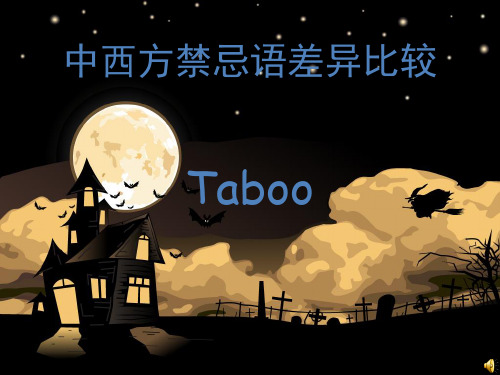
• 尊称 • 尊:尊府、尊兄、尊驾、尊夫人; 贤:贤弟、贤妻; 贵:贵体(有问候意)、贵姓、贵庚; 高:高朋、高见; 大:大礼、大作、大驾。 惠:惠存、惠临、惠顾、惠赠 • 令: 令尊、令堂、令郎、令爱
• 2) 西方受自由平等思想的影响,强调个体 和个人价值,提倡个人的自信和实事求是 的态度,面对赞扬与恭维,大多趋于接受 ,并表示高兴与感谢。
中西方禁忌语差异比较
Taboo
引言
• 在经济和信息日益全球化的今天,不同国家、不 同民族和不同种族人们之间的交流也日益频繁。 不同文化群体的人们在相互接触的过程中,不是 想说什么就说什么,在日常交际中也不是什么话 题都可以涉及,在一定的文化中,参与交际的人 们都会不约而同的对某些话题和某些词汇有意回 避,因为人们不愿或不敢随便谈论这些话题和词 汇,于是语言中就出现了禁忌语。
• 4)五与星期五 • 在中国,“五”是个和谐、优美的数字,表示 “圆满、完全”,特别受人喜爱。如“五湖四海 ”、“五光十色”等。在西方人的观念中,“五 ”没有特别的涵义,却认为“星期五是个不吉祥 的日子,常给人以恐怖之感。一种说法是,星期 五是耶稣受难日,所以主凶,还有人认为,据《 圣经》记载,人类的祖先亚当和夏娃被逐出伊甸 园也是星期五这一天。含有“Friday”的习语也说 明了这一点,如:Black Friday(耶稣受难日,发 生灾难事件的星期五)
• •
3)六与七 在中国,“6”是一个时空谐和数,最为吉祥。俗语“六 六大顺”即是最好的印证。在使用电话号码或汽车车牌号 时,人们尤其钟爱尾数为“66”、“666”、“6666”这几组 数字,因为它们象征着顺顺利利,万事如意。然而由于宗 教的影响,在西方“6”不是一个受欢迎的数字,被视为大 凶数,这从以下习语中也可见。如:at sixes and sevens( 乱七八糟;糊涂的;迷茫的)、hit sb. for six/knock sb. Six (给敌人/某人以毁灭性打击) 、six of the best (以藤 鞭击六———一种惩罚手段)、six penny(不值钱)、six of one and half a dozen of the other (半斤八两,差不多)等 。在西方“666”一直被基督教称为“魔鬼数字”,因为在 《圣经》中,恶魔撒旦的代表符号便是“666”,所以在基 督教中6 代表了浑沌不堪。
中西方禁忌(Taboos between China and Western countries)
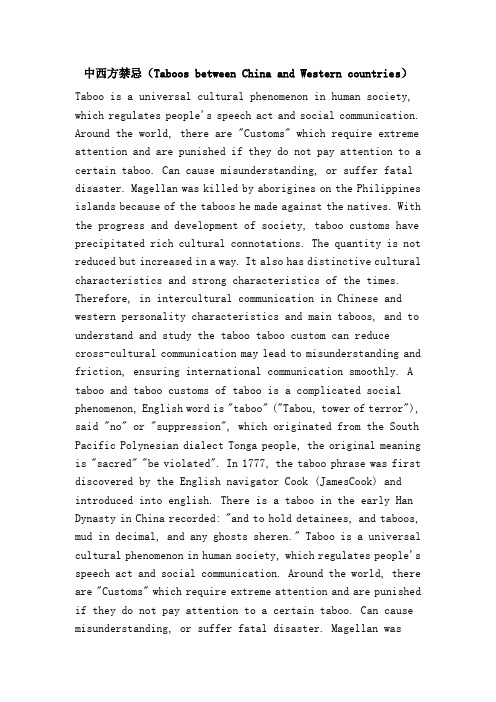
中西方禁忌(Taboos between China and Western countries)Taboo is a universal cultural phenomenon in human society, which regulates people's speech act and social communication. Around the world, there are "Customs" which require extreme attention and are punished if they do not pay attention to a certain taboo. Can cause misunderstanding, or suffer fatal disaster. Magellan was killed by aborigines on the Philippines islands because of the taboos he made against the natives. With the progress and development of society, taboo customs have precipitated rich cultural connotations. The quantity is not reduced but increased in a way. It also has distinctive cultural characteristics and strong characteristics of the times. Therefore, in intercultural communication in Chinese and western personality characteristics and main taboos, and to understand and study the taboo taboo custom can reduce cross-cultural communication may lead to misunderstanding and friction, ensuring international communication smoothly. A taboo and taboo customs of taboo is a complicated social phenomenon, English word is "taboo" ("Tabou, tower of terror"), said "no" or "suppression", which originated from the South Pacific Polynesian dialect Tonga people, the original meaning is "sacred" "be violated". In 1777, the taboo phrase was first discovered by the English navigator Cook (JamesCook) and introduced into english. There is a taboo in the early Han Dynasty in China recorded: "and to hold detainees, and taboos, mud in decimal, and any ghosts sheren." Taboo is a universal cultural phenomenon in human society, which regulates people's speech act and social communication. Around the world, there are "Customs" which require extreme attention and are punished if they do not pay attention to a certain taboo. Can cause misunderstanding, or suffer fatal disaster. Magellan waskilled by aborigines on the Philippines islands because of the taboos he made against the natives. With the progress and development of society, taboo customs have precipitated rich cultural connotations. The quantity is not reduced but increased in a way. It also has distinctive cultural characteristics and strong characteristics of the times. Therefore, in intercultural communication in Chinese and western personality characteristics and main taboos, and to understand and study the taboo taboo custom can reduce cross-cultural communication may lead to misunderstanding and friction, ensuring international communication smoothly. A taboo and taboo customs of taboo is a complicated social phenomenon, English word is "taboo" ("Tabou, tower of terror"), said "no" or "suppression", which originated from the South Pacific Polynesian dialect Tonga people, the original meaning is "sacred" "be violated". In 1777, the taboo phrase was first discovered by the English navigator Cook (JamesCook) and introduced into english. There is a taboo in the early Han Dynasty in China recorded: "and to hold detainees, and taboos, mud in decimal, and any ghosts sheren." tabooIncluding the nature, natural objects (stars, lightning) as a sacred form about their taboos and behavior; of some animals and plants taboo; worship of ancestors and gods, the gods and ancestors have symbolic relics taboo [1], also formed in interpersonal relationships in the long-term taboo customs. Freud, a famous psychologist in Austria, made a deep study of the cultural phenomenon of taboo in his book totem and taboo. In his view, Tab (taboo), in our view, it represents two different aspects of meaning. First of all, it's "mysterious", "dangerous", "forbidden", and "unclean"". The opposite of Tabin Polynesian language is "NOA", which means "popular" or "usually approachable". So, that means a taboo have been restricted or prohibited and can not touch the nature of things exist. We usually say "sacred person or thing" in meaning and has some of the same tower [2]. Generally passed through oral inheritance and social demonstration. "Taboos are almost everywhere. In the same culture,Taboos differ and differ because of regional or sub cultural differences. Taboos vary much in different cultures." [3] taboos involve speech acts, and if you do not pay attention to or disrespect each other's taboos, it is easy to hurt each other's feelings. Because of this, more people taboo communication, especially cross-cultural communication is a sort of a small obstacle. Taboo refers to violations of the expectations of the society, it not only comes from the people of some mysterious force of fear, but also contains people in the long-term accumulation of experience in the struggle with nature, and formed in interpersonal communication in the long-term social etiquette. Taboo customs vary according to nationality, society, culture, region, occasion and so on. Therefore, people must be very sensitive to taboos incross-cultural communication and have to study it. They have to pay attention to it and have to avoid it in order to communicate smoothly. Two, the taboo characteristics of Chinese and Western taboos are the common cultural phenomena of different ethnic groups in the world, but the content and form of taboos are different. Taboos, as a kind of non behavioral normative folk customs, are closely related to the cultural characteristics and traditions of the society in which taboos are based. In the course of human history, the samenation usually has a common spiritual structure, value system, psychological characteristics and behavior patterns, and it is in this common cultural background that they have a sense of belonging and identity. The dialectics of Chinese classical philosophy emphasizes the harmony and interpenetration of opposites, that is, unity in opposites, and the whole world is a unity. The book of changes uses the interaction of two opposing forces, yin and Yang, to explain the development and change of things. Chinese traditional culture emphasizes the harmony between man and nature as a whole. "Harmony" in the political field is the spring and autumn unified concept, on ethical performance for the overall situation; in terms of value, although the ancient China is private ownership, but on the relationship between individual and society still emphasize collectivism, value orientation in order to safeguard the overall interests of the. With the changes of the times, the phenomenon of taboo which reflects the patriarchal clan system and hierarchy has disappeared. But there are still taboos in appellation. The dialectics of western philosophy is similar to the dialectics of Chinese classical philosophy. Heraclitus, an ancient Greek philosopher, also believes that the world is a harmonious unity. However, the 14 sixteenth Century European Renaissance and religious reform is like a star in the night of seventeenth Century; Newton and other scientists reveal the secrets of the universe, inductive reasoning observation, Bacon advocated the scientific research as the hard facts; eighteenth Century cultural enlightenment movement swept Europe and the United States, national independence, democracy and Republic, within the in the 21st century, "the world is a philosophy in the unity of opposites", the pursuit of "freedom and equality" and "civil rights, thepeople" concept and "individual struggle" in the western society is deeply rooted in the hearts of "individual standard" consciousness as the mainstream consciousness. For the pursuit of freedom and human rights, the concept of "privacy" (Privacy) in personal life is extremely developed, and privacy has become an important content of taboos. In this colorful folk culture, some factors vary from culture to culture, western culture is likely to be highly appreciated from the Chinese culture, and Chinese culture of "bad habits" may be as unalterable principles in western culture. Some topics are popular in Chinese culture, but in Western cultures it may constitute a violation of privacy. "When in Rome, do as the Romans do" is a must. Three, the taboos of Chinese and western social taboos mainly exist in all aspects of human social interaction. Chinese and Western English speaking countries have different social taboos because of different cultural backgrounds, cultural traditions, religious beliefs and different hierarchical concepts. 1. self esteem and privacy incross-cultural communication, involving Chinese self-esteem or "face" and Westerners privacy issues is absolutely not openly asked, otherwise it will be regarded as rude and disrespectful. The Chinese people pay most attention to "face"". In Chinese culture, "face" is a symbol of status, identity, honor and self-respect. Chinese saying "don't hit the face,Don't speak Jieduan, Chinese the biggest taboo is related to personal dignity "weaknesses" and "pain" and "shortcomings" "wrong" and so on. Chinese people are good at face, criticism can not be mentioned directly, but should be expressed in a tactful way. No evil human nature concept in China. For the personality cultivation of the heart should be mature and timesof day. Instead of trying hard to improve one's own character, but to pay attention to the faults of others, just as a stone hits his own foot, society will come to the concept of "disgrace" and so on。
taboo中外文化禁忌对比分析
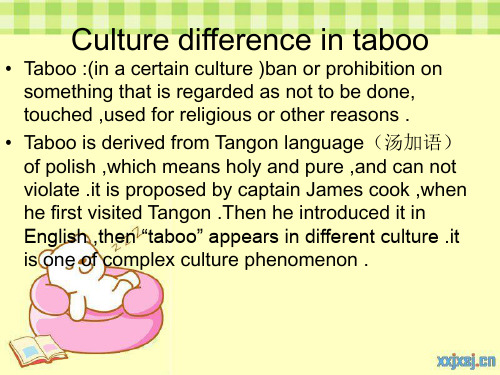
It is not similar with the use of Chinese culture considering the different culture . eg ,we use “你发福了” to compliment someone healthy body, and indicate that he has a better living standard .but we should replace it with stout in English culture.
2.Vocabulary or phrase
• Occidentals are greatly exquisite at body appearance, posture respect terms. people who speak English especially ladies, they are greatly sensitive to their weight and body. If you say she fat, she will not be happy. • They generally do not use “ugly” to describe looks and posture which is not beautiful .however , they use “plain”, “ordinary” to describe people ,and use of “chubby, plump “and “slim, slender “to substitute “fat “or “skinny”.
• We all know that the pronunciation of number 4, 7 like the word “death”, “gas”, so One phone number, few people are willing to choose the end of 4, 7 number .and 14 is not used by people because it may means will die(要 死).what is more ,73 and 84 are vital to life-ordeath . • On the contrary ,people like numbers with end of 6 or 8 ,which are thought of luck or success .In the ancient times ,the emperor of china are fond of number 9 ,which has the same pronunciation with “久”. because they indicate the meaning of forever and unity and solidarity
中西文化禁忌对比

中西文化禁忌对比Definition●文化禁忌是指在某个民族或宗教传统文化里禁忌的一些事物,行动或言语。
来源:灵物崇拜。
十八世纪英国航海家库克来到南太平洋的汤加群岛,发现那里有许多奇特的现象,例如,某些东西只允许特定的头等人物(神、僧侣、国王、酋长)使用,而不允许一般人沾边;或只允许作特定的用途,而不准用于一般的目的;或不许某一社会集团(例如妇女)的人使用等等。
那里的居民称这种禁忌为taboo 直译为“塔布”塔布。
后来“塔布”这个词进入了人类学、社会学、语言学等领域,作为一种特殊的社会现象(禁忌)的专用名称而被广泛运用。
“塔布”现象包括两方面:一方面是受尊敬的神物不许随便使用,另一方面是受鄙视的贱物不能随便接触。
因此,所谓“语言塔布”,实质上也包括两个方面,一是将语言当作神灵一样来崇拜(即语言拜物教),二是在某些场合对一些特定语言的禁用或代用(即委婉语词或鄙视语词的运用)。
语言禁忌语言禁忌是语言灵物崇拜的结果。
语言本来是劳动创造并与劳动生产一起发展起来的一种社会交际工具。
但是在对自然现象和自然力不理解的环境里,语言往往和某些自然现象联系起来,或者同某些自然力给人类的福祸联系起来。
这样,语言就被赋予了一种它本身没有的、超人的感觉和超人的力量。
语言成了祸福的根源。
谁要是得罪这个根源,谁就会得到加倍的惩罚;反之,谁要是讨好这个根源,谁就会得到庇护和保佑。
这就自然而然地导致了语言的禁忌和灵物崇拜汉语中的禁忌●谐音式禁忌●用反义语来替换不吉的词语,谓“讨口彩”●用比喻来代替不吉的词语英语语言中的禁忌一般认为包括下列两大类:●疾病(disease)●死亡(death)死亡禁忌●“死”是各民族最忌讳的字眼,因此在语言交际中人们总是回避它,尽量用委婉语代之。
英语中表示“死亡”的委婉语非常丰富,如“pass away, go to the heaven, go to sleep, go to see the God, depart, be in heaven with God”等等。
从禁忌语看中外文化差异taboo words,culture differences
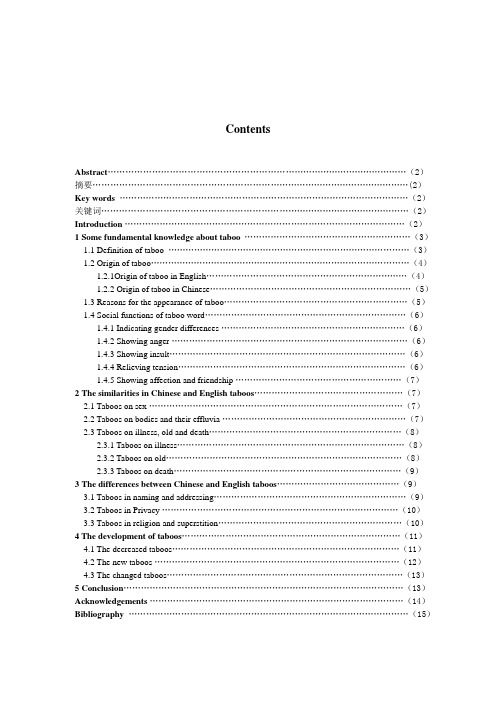
ContentsAbstract (2)摘要 (2)Key words (2)关键词 (2)Introduction (2)1 Some fundamental knowledge about taboo (3)1.1 Definition of taboo (3)1.2 Origin of taboo (4)1.2.1Origin of taboo in English (4)1.2.2 Origin of taboo in Chinese (5)1.3 Reasons for the appearance of taboo (5)1.4 Social functions of taboo word (6)1.4.1 Indicating gender differences (6)1.4.2 Showing anger (6)1.4.3 Showing insult (6)1.4.4 Relieving tension (6)1.4.5 Showing affection and friendship (7)2 The similarities in Chinese and English taboos (7)2.1 Taboos on sex (7)2.2 Taboos on bodies and their effluvia (7)2.3 Taboos on illness, old and death (8)2.3.1 Taboos on illness (8)2.3.2 Taboos on old (8)2.3.3 Taboos on death (9)3 The differences between Chinese and English taboos (9)3.1 Taboos in naming and addressing (9)3.2 Taboos in Privacy (10)3.3 Taboos in religion and superstition (10)4 The development of taboos (11)4.1 The decreased taboos (11)4.2 The new taboos (12)4.3 The changed taboos (13)5 Conclusion (13)Acknowledgements (14)Bibliography (15)Culture Differences between Chinese and Western from TabooAbstract: Language never exists as an isolated object, which is always showing its different appearances in different nations, different countries and different areas all over the world together with culture. Nowadays, the information and globalization bring mankind more and more opportunities of intercultural communication in our “earth village”. To avoid misunderstandings, discomforts and embarrassments during intercultural communication, people need to get fundamental knowledge about taboos in non-native countries. Taboo speech, originating from social life, is part of social taboos. It involves many aspects in people’s daily life including taboo things, places and persons which are made untouchable or sacred by religious customs or superstition or other reasons. The article, based on studies on taboos' generalities and the background, in which they arise, as well as their cultural similarities and differences between China and the West, aims at familiarizing English learners with cross-culture background, developing their cross-cultural awareness, and avoiding unnecessary communication failures.摘要: 语言,从来不是作为一个单独的个体而存在,它在文化斑斓的外衣下以不同的面貌出现在世界上不同的民族,不同的国家,不同的地区中。
中西文化禁忌对比

用有关或相近的事物名称来代替
浙江一带,小孩肥胖,忌说“壮”,因本 地猪肥叫壮,要以“个头好”,“补胚好” 代胖的意思。人有病,最忌说“生病”, 要说“不新鲜”、“懒意’、“着力过了” 等。人死了,其家人忌说“死”,要说 “老了”、“好了”、“过辈了”等。小 孩夭亡,也忌说“死”,要说“逃出去 了”、“转去了”。
中西文化禁忌
语言禁忌 节日禁忌 社交禁忌 饮食禁忌 生活禁忌
语言禁忌
语言禁忌是语言灵物崇拜的结果。语言本来是劳 动创造并与劳动生产一起发展起来的一种社会交 际工具。但是在对自然现象和自然力不理解的环 境里,语言往往和某些自然现象联系起来,或者 同某些自然力给人类的福祸联系起来。这样,语 言就被赋予了一种它本身没有的、超人的感觉和 超人的力量。语言成了祸福的根源。谁要是得罪 这个根源,谁就会得到加倍的惩罚;反之,谁要 是讨好这个根源,谁就会得到庇护和保佑。这就 自然而然地导致了语言的禁忌和灵物崇拜。
汉语中的禁忌
谐音式禁忌 用反义语来替换不吉的词语,
谓“讨口彩” 用比喻来代替不吉的词语。
谐音式禁忌
旧时代的戏班子里有很多机会的字,尤其 最忌讳“散”字。因为散班是戏班里最大 的灾难,凡事与“散”字同音的,也必须 用别的字代替。比如雨伞,因为“伞”字 与“散”同音,得叫“雨盖”、“雨挡”、 “雨遮”、“雨拦”。又如船上人讳言 “翻身、搁住”等字眼,于是把“帆”叫 做“蓬”,把“箸”叫作“筷”。
而在中国人的观念中, 上述西方人的隐私是极为平常的事, 而且在社交中常常作为关注的话题加以讨论, 而绝没有西 方人的那种感觉。中国人也有忌谈的东西, 那主要是涉及 个人尊严的“ 短处”、“ 痛处” 、“ 缺点” 、“ 毛病” 等方面的事情。中国有句俗话“打人别打脸, 说话别揭 短”, 讲的就是这个道理。
